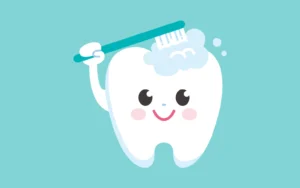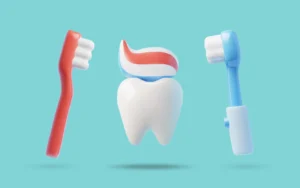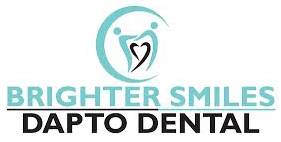Electric vs. Manual Toothbrushes: Which Is Better for Your Smile?
At Brighter Smiles Dapto Dental, we understand that keeping your smile bright and healthy requires good daily oral hygiene habits. One of the most important tools in your oral care routine is your toothbrush. But with so many options available, you may find yourself wondering whether an electric toothbrush is worth the investment, or if a manual toothbrush does the job just as well.
In this blog, we’ll dive into the pros and cons of both electric and manual toothbrushes to help you make an informed decision that best suits your dental needs.

The Manual Toothbrush: A Tried-and-True Classic
Manual toothbrushes have been around for centuries, and for good reason—they’re simple, effective, and accessible. But as with any tool, there are both benefits and limitations.
Pros of Manual Toothbrushes:
1. Affordability
– Manual toothbrushes are generally much more affordable than electric ones. You can easily find a quality manual toothbrush at your local store for just a few dollars, making it a budget-friendly option for most people.
2. Wide Variety of Options
– Manual toothbrushes come in various shapes, sizes, and bristle types. Whether you have sensitive teeth, are looking for a soft or medium bristle, or prefer a toothbrush with a small head, manual options are available to meet specific needs.
3. Easy to Travel With
– A manual toothbrush doesn’t require batteries or charging, making it easy to carry with you when you’re on the go. It’s lightweight and compact, so it can easily fit into your bag or suitcase without any hassle.
4. Effective When Used Correctly
– If used with proper technique, manual toothbrushes can clean your teeth just as effectively as an electric toothbrush. Brushing at least twice a day for two minutes, making small circular motions, and reaching all areas of your mouth can lead to optimal results.
Cons of Manual Toothbrushes:
1. More Room for Human Error
– Because a manual toothbrush requires you to physically control the brushing motion, it’s easier to miss certain areas of your mouth or apply too much pressure, potentially leading to uneven cleaning or gum damage.
2. No Timers or Pressure Sensors
– Many people underestimate how long they brush, and with a manual toothbrush, it’s easy to stop brushing too soon. Additionally, if you brush too hard, it can wear down your enamel or cause gum recession, and there’s no way to tell you are applying too much force.
3. Effort Required
– Brushing with a manual toothbrush requires more physical effort than an electric one. For individuals with mobility issues, such as arthritis or other conditions, it may be more challenging to brush effectively with a manual toothbrush.
The Electric Toothbrush: A Modern Marvel
Electric toothbrushes have gained immense popularity in recent years for their ease of use and advanced features. Let’s explore the pros and cons of switching to an electric toothbrush.
Pros of Electric Toothbrushes:
1.More Effective Plaque Removal
– Research has shown that electric toothbrushes can be more effective at removing plaque compared to manual toothbrushes. The oscillating or rotating brush heads on electric toothbrushes can clean your teeth more thoroughly and with less effort, leading to better overall oral hygiene.
2. Built-In Timers
– Most electric toothbrushes come with a built-in timer, ensuring you brush for the recommended two minutes. Some models even alert you when it’s time to move to a different quadrant of your mouth, helping you cover all areas evenly.
3. Pressure Sensors
– Many electric toothbrushes have pressure sensors that notify you if you’re brushing too hard. This feature is especially helpful in preventing gum damage and enamel wear, issues often caused by overzealous brushing.
4. Ideal for People with Limited Mobility
– For individuals with limited dexterity, such as those with arthritis or carpal tunnel syndrome, electric toothbrushes can make brushing much easier. The automatic motion of the brush does most of the work for you, requiring less effort to achieve a thorough clean.
5. Fun for Kids
– Getting children to brush their teeth can be a challenge, but electric toothbrushes often come with fun designs and interactive features that make brushing more enjoyable for kids. Some models even connect to smartphone apps, turning brushing into a game that encourages better habits.
6. Advanced Features
– Many electric toothbrushes offer additional features, such as different brushing modes (e.g., sensitive, whitening, gum care) and smart connectivity, which tracks your brushing habits via an app and provides feedback for improvement.

Cons of Electric Toothbrushes:
1. Cost
– One of the biggest downsides of electric toothbrushes is their price. They can be significantly more expensive than manual toothbrushes, with some high-end models costing over $400. Additionally, you’ll need to replace the brush heads regularly, which adds to the long-term cost.
2. Bulky and Less Portable
– Electric toothbrushes are bulkier than manual ones, and they require either batteries or a charger. This can make them less convenient for travel, as you’ll need to bring the charging station along or remember to pack spare batteries.
3. Charging and Battery Life
– If you forget to charge your electric toothbrush, it can run out of battery mid-brush, leaving you without a functioning toothbrush. While most electric toothbrushes have long battery lives, it’s still something you need to keep in mind.
4. Replacement Brush Heads
– Replacing the brush heads on an electric toothbrush is necessary every three months, just like with manual toothbrushes, but the cost of these replacements can add up. Additionally, not all brands have universally available brush heads, so you might have to plan ahead to restock.
Which Toothbrush Is Best for You?
So, which toothbrush is better: electric or manual? The answer depends on your personal needs, preferences, and lifestyle. Here are a few factors to consider when making your decision:
Budget: If you’re looking for an affordable option, manual toothbrushes are the clear winner. However, if you’re willing to invest in your oral health and enjoy the convenience of advanced features, an electric toothbrush might be worth the cost.
Brushing Technique: If you’re confident in your ability to brush thoroughly and evenly with a manual toothbrush, it can be just as effective. But if you struggle to maintain proper technique or want to ensure you’re brushing for the right amount of time, an electric toothbrush offers more guidance.
Mobility Issues: For people with limited mobility or dexterity, an electric toothbrush can make a world of difference, helping them maintain proper oral hygiene with less effort.
Children: Electric toothbrushes can be more engaging for children, making it easier to encourage good brushing habits.
Conclusion
At *Brighter Smiles Dapto Dental*, we recommend choosing the toothbrush that best suits your individual needs and makes brushing an enjoyable part of your daily routine. Both electric and manual toothbrushes have their own unique advantages, and the most important thing is that you brush consistently and correctly to keep your smile healthy.
If you have any questions or would like personalized recommendations, feel free to schedule an appointment with us. We’re always here to help you make the best choices for your oral health!


